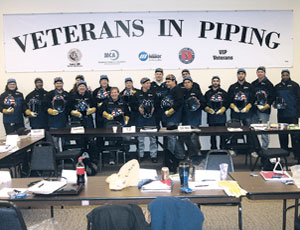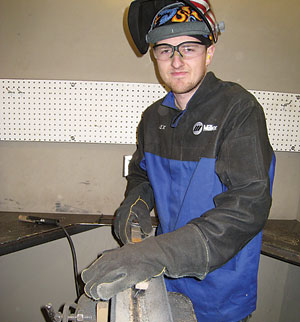For U.S. military veterans, finding a civilian job has long been only half the battle. Adjusting to a nonmilitary home life and work world has been equallly challenging. The plumbers’ and pipefitters’ union is hoping to ease that switchover for veterans of recent Middle East conflicts by including two weeks of “transition training” as part of its new 18-week Veterans In Piping (VIP) welding pre-apprentice program. The extra training helps veterans, particularly those with physical and emotional war injuries, handle workplace biases and gives potential employers more confidence that their new hires can handle civilian jobsite stresses.


VIP, launched in December at union Local 26 in Tacoma, Wash., aims to train vets to fill projected need for welders in construction and shipbuilding in the Puget Sound area. Graduates who can pass the certification test on just one weld can become union apprentices, earning up to $20 per hour plus benefits.
All but one of VIP’s first 16 graduates are now employed, and a second class is under way. The union-financed program also is training another group of 16 at the Marine Corps’ Camp Pendleton in California, who are set for discharge. The program is now expanding nationwide.
The VIP program instructs students on best practices for resuming family and work lives no longer governed by military rules and culture. “If you were a sergeant in the military, you can’t come home, bark orders and expect your coworkers or family to jump to attention,” says Anne A. St. Eloi, a union representative who developed the program. “We have counseling, job training and interview training, and we invite contractors to visit.”
VIP instructors say veterans are highly valued students. “We had 75% of the first class pass the exam, as opposed to 40% in an average accelerated class,” says welding instructor Mike Stull. “Veterans are mature, accountable, drug free and have good leadership skills.” He says several graduates of the first VIP class were certified for multiple weld types, and are earning the maximum for first-year apprentices.
Transition training is led by Judae Bost’n, an educator from Bates Technical College in Tacoma. Experienced in working with Vietnam War veterans, she focuses on self-image and learning problems that may be caused by war injuries and post-traumatic stress. Bost’n says the Iraq War’s signature wound is brain damage caused by improvised explosive devices (IEDs). “The explosion can cause a concussion when sound waves go through the skull. This can result in memory problems and frustration,” she says. The injury makes it harder to retain newly learned skills, Bost’n adds.
Student Mike Sterling, a former Army sergeant, is a 22-year veteran who completed four tours in Iraq and was hit 14 times by IEDs. “I could have just retired, but I wanted to be part of a team, have a career and make something happen,” Sterling, 41, says. Christy Heiser, who has a degree in animal science and served in the first Gulf War and, more recently, with an Air National Guard unit, now aims to be a second-generation welder. “My father didn’t think girls should weld, but I always wanted to,” she says.
Sterling says the VIP training has helped him feel calmer. He is now shop steward for his class. Says Bost’n, “We show students how military life is different than civilian life.”


Post a comment to this article
Report Abusive Comment